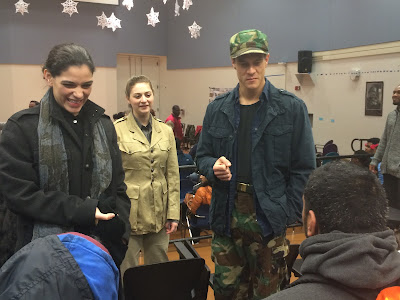From Kissing to Karate: Notes from the Will on Wheels tour of Macbeth
By A.C.T. School and
Community Programs Coordinator Alec MacPherson
Audiences at Will on Wheels performances are always eager
to pick the brains of the actors involved. For some audience members, a Will on
Wheels performance will be the first time they’ve seen Shakespeare performed
onstage; for others, it will be the first time they’ve seen a live theatrical
performance at all. But from Marin middle school students to San Francisco
senior citizens, A.C.T.’s second-year Master of Fine Arts (M.F.A.) Program actors are lucky
to encounter some of the most diverse and engaging audiences when they embark
on A.C.T.’s annual Shakespeare tour to Bay Area schools and community centers.
 |
| M.F.A. Program actors (L to R) Diana Gonzalez-Morett, Julie Adamo, and Stephen Wattrus talk to students during the Will on Wills pre-show interaction. Photo by Jasmin Hoo. |
“How did you memorize all those lines?”
“Did you have a karate sensei teach you how to fight?”
“Was that a real kiss? Because that’s serious.”
The Will on Wheels touring program came out of a desire to provide
our professional-actors-in-training the opportunity to experience the unique rewards
of performing classical theater on tour. It is our hope that the tour helps
these young theater artists develop stamina, flexibility, and the ability to
engage with, and adapt to, a variety
of venues and audiences. Over the course
of the two-week tour, the class of 2017 will perform this year’s production of Macbeth for 2,500 students at 15
different sites in the Bay Area, in spaces ranging from a packed community
center multipurpose room to a 700-seat public school auditorium.
“When did you know you wanted to be an actor?”
“How did it feel delivering some of the most famous lines
of all time?”
“Wait . . . that was a real kiss?”
The
tour is not without its challenges. At our first performance this year, a
teacher unexpectedly called in sick, and five minutes before curtain the school
decided to add 60 chairs to make space for the students without a homeroom. While
this threw a wrench in our plans (not to mention adding a squeaking class
guinea pig to our audience) and pushed back our curtain time, the M.F.A. cast
rallied around director Giles Havergal’s decree: “There’s no way we’ll turn
away 60 more kids who want to see Shakespeare.”
“Do you believe the three witches are truly supernatural or
are they charlatans?”
“What advice do you have to my students who want to pursue
acting?”
“Um . . . how do you kiss someone onstage without catching
feelings for them?”
It is validating for the actors to hear these questions, which show the actors that the audience was following along and can
even help them consider the play in a whole new light. For me, however, the
most rewarding question doesn’t come from the audience. It comes from the M.F.A.
Program actors who visit the Education & Community Programs Department office
after the tour and ask, “How can I work with those students again?”
*Click here to learn more about A.C.T.'s education programs and community partnerships.

